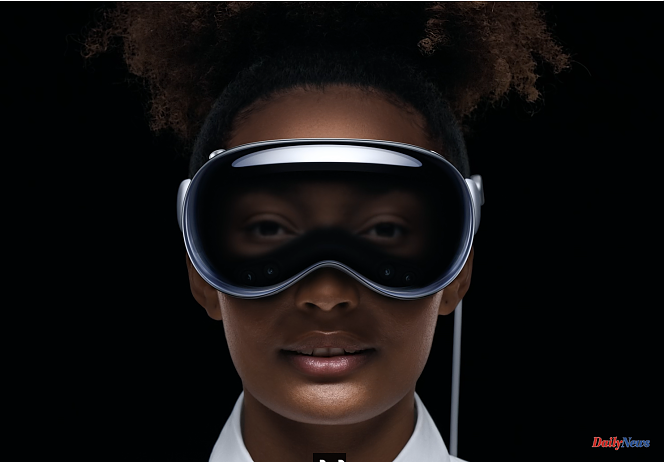From its headquarters in Cupertino, California, Apple unveiled a series of software and hardware improvements on Monday (June 5), as well as the first representative of a new product line, an astonishing virtual and augmented reality headset.
This product was awaited by the enthusiasts of the brand, since it is the first radical and innovative device released under the patronage of the CEO of Apple, Tim Cook, who has occupied the seat of Steve Jobs since the latter's death, in 2011. This helmet was also hoped for by virtual reality professionals, a sector that is slow to conquer the general public despite the heavy investments of companies like Meta.
This new device looks like a thick ski mask covered with a glass screen that one might think transparent: the eyes of its user seem to show through. It's an illusion: his eyes are actually obscured. But their image is projected onto the helmet's exterior, an animated representation following the actual movements of the pupils - a refinement meant to make the helmet more socially acceptable.
Inside, the user looks at a screen displaying what the helmet films via cameras, i.e. the reality that surrounds it – a bit as if the helmet were transparent, here again. The user therefore sees the room in which he is seated, familiar and reassuring, but he can darken it with a small wheel: a little, a lot, or totally, to fully enter virtual reality. And immerse yourself in a beautiful landscape, like a lake filmed at dusk, for example.
Apple intends its Vision Pro for a wide variety of uses: cinema projection, photo consultation, but also office automation or even digital creation. The headset can display apps from Macs, iPhones and iPads. Multi-screen enthusiasts will display them on three large windows floating around them, and resize them at will, using very discreet hand gestures, which also allow windows to be moved back and forward.
The sound is reproduced in three dimensions thanks to the use, on each ear, of two slightly offset speakers. The helmet can obviously render images and applications in three dimensions.
Apple demonstrated a few games, unfortunately few attractive titles, an educational application revealing the functioning of a human body, DJ software with a new interface, a planetarium, etc. The brand has thought of young children, who will be able to display characters from the Disney universe around them.
But we will think before giving a glass-clad helmet to a child, who risks bumping into a wall with too sudden a gesture. This is one of the weaknesses of a device that has several: a field of vision that is a little too narrow to fully immerse the user (Apple does not communicate on the viewing angle) and a display resolution that, although superior to that of almost all its competitors (23 million pixels in total), will probably not be enough to make reality perfectly clear.
The headset has its own memory and its own ultra-fast processor. But it does have a wire all the same, which connects it to a small battery to put in your pocket, offering only two hours of autonomy. Still on the disappointment front: Apple doesn't put much emphasis on the headset's video conferencing capabilities. It must be said that this one hides the face when you call.
Despite this, the product seems designed with unprecedented inventiveness, and an exceptional concern for ergonomics, both in terms of software and hardware. When it is released in 2024, it will be supplied with several interchangeable headbands and screen skins, compatible with different face morphologies.
All these details make it particularly intriguing. Only a test can reveal if it is a truly revolutionary product, capable of bringing virtual reality out of privacy, or a niche device. The bar is set high, with a price tag of $3,500 (about $3,250), putting it out of reach for the vast majority of homes.
The new version of the core iPhone software will be released in September. With it, the owners of the smartphone, when they refuse an incoming call, will see the message from their correspondent displayed in real time, at the very moment when the latter dictates it, in the form of a scrolling text at the screen. If they deem it necessary, they can therefore try to answer before the correspondent hangs up. At least among operators who will equip themselves for this purpose.
Owners of Apple smartphones will be able to choose the image that will be displayed on their correspondent's iPhone when they call, and customize the text under which their name appears, by choosing its font and color.
When they meet other people, they can bring their iPhone a few inches closer to theirs to share their email or phone number with one click. In the same way, they will be able to synchronize the playback of music or a series episode.
A new application called "diary" will allow them to memorize the photos they want to keep, alongside maps, notes, sports training, etc. This application will also allow you to set goals reminded by alerts.
The brand has announced an enlarged version of its mobile computer, the Macbook Air, which has a 15.3-inch screen, compared to around 13.5 inches for its predecessors. Its battery holds, according to Apple, 18 hours before requiring a recharge. Weighing 1.5 kg, it has a headphone jack and will cost 1,600 euros. It will be available during the first half of June.
Apple took the opportunity to unveil a new version of its large desktop computer, the Mac Pro, integrating at its heart the M2 ultra, Apple's fastest chip, which replaces the Intel processor it housed until SO. According to Apple, this one will be up to three times faster than its predecessor. Its price will be very high: 8,300 euros.
Apple has added a function to its AirPods headphones: they will be able to lower and raise the volume depending on the context, even activate noise reduction when the environment becomes noisy, or on the contrary let the sound through when their owner will start a conversation, to make the person in front hear. All automatically.
In high-end hotels equipped with recent compatible TVs, you can read the content of your iPhone on the TV screen in a simple way: all you have to do is scan a QR code on the screen to establish the connection. This will allow, for example, to launch a song or start an episode of a series.
By car, in compatible vehicles, probably rare at first, all passengers with an iPhone will be able to connect to the car's sound system to play their music.












